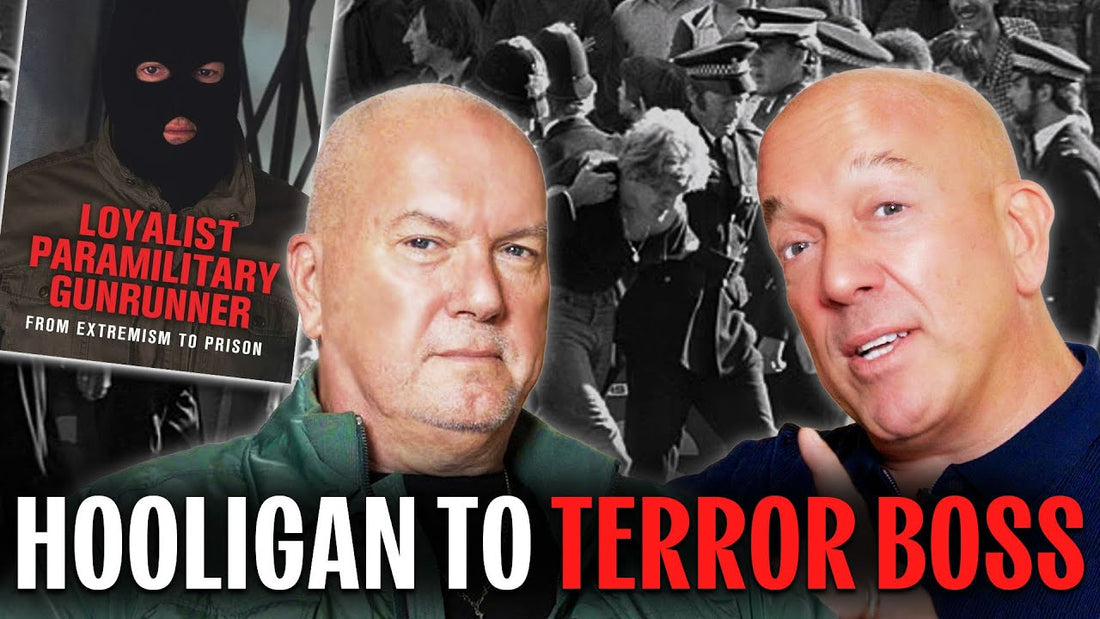Frank Portinari isn't your average ex-hooligan. His story isn't just one of fists, terraces, and testosterone-fuelled Saturdays; it's a deeper journey through British subcultures, sectarian conflict, and personal redemption. Appearing on the James English podcast, Portinari doesn't hold back. He speaks candidly about his time with West Ham's Inter City Firm (ICF), his involvement with Ulster loyalist paramilitaries, and the cost of a life spent on the frontlines of ideological and physical warfare.
Growing Up in Islington
Raised in Islington in a working-class Catholic household, Portinari's early life was marked by scraps, schoolyard violence, and a need to survive. But it wasn't just survival that drove him—it was identity. In the tribal world of 1970s and 80s Britain, nothing offered identity quite like football. And for Frank, West Ham United was more than a club; it was family, it was purpose, it was war.
Life with the ICF
The Inter City Firm, known infamously for their organised football hooliganism, gave Portinari a brotherhood. It also gave him a reputation. He recounts in the interview how structure and discipline defined the ICF—a far cry from the chaos often attributed to football violence. They had rules, a hierarchy, and a sense of honour. You didn't bring shame to the firm. You stood your ground, but you didn’t kick someone when they were down. It was brutal, but it was strangely noble in its own distorted way.
From Football to Firearms
But football was just the gateway drug. As Portinari got older, the tribalism of club allegiance gave way to something more politically charged: Loyalism. He began to identify with the Ulster Volunteer Force (UVF), a paramilitary group fighting to maintain Northern Ireland's union with Britain during The Troubles. This wasn’t just a flirtation with extremism. Portinari became a key player in arming the UVF, smuggling weapons and supporting their cause from across the water.
He admits openly that he helped ship guns to loyalist groups in Northern Ireland. Not for money, he insists, but for belief. Portinari wasn’t looking to profit; he was looking to take a stand. That decision would land him in prison after an MI5 sting operation exposed his arms deals. Sentenced to five years, he found himself in HMP Belmarsh—one of Britain’s most notorious high-security prisons. There, among IRA prisoners and some of the country’s most dangerous men, he had time to reflect.
Prison and Reflection
What emerges in his interview is not glorification, but reckoning. He doesn’t glamorise the violence. He doesn’t ask for sympathy. But he does want to be understood. He talks about the paranoia, the sleepless nights, the pressure of constantly watching your back. The emotional toll of decades spent consumed by violence and ideology isn’t something that leaves quietly.
A New Perspective on Violence
Portinari also uses the podcast to deliver a scathing critique of modern youth violence. He sees today’s knife crime epidemic and gang culture as directionless—all the aggression, none of the code. “We had rules,” he says. “These kids don’t.” It’s a controversial view, but one rooted in his experience. Where he once found a sense of belonging, he now sees chaos, nihilism, and a lack of guidance.
Loyalty Above All
And yet, for all the violence, there’s a human thread running through his story: loyalty. To his friends, to his family, and yes, even to causes most would struggle to understand. But Portinari doesn’t ask you to agree. He asks you to listen. That’s perhaps what makes his podcast appearance so compelling. He isn’t selling redemption, nor is he wallowing in regret. He’s simply laying it out—the fights, the guns, the jail time, and the scars.
Mental Health and Trauma
He talks about his battles with mental health, the post-traumatic stress that came after the physical violence had ended. The dreams. The anxiety. The deep, haunting reflection. There’s a sense that while Portinari might have left the battlefield, the battlefield never really left him.
A Complex Transformation
Ultimately, Frank Portinari’s story is one of transformation. Not in the clean, Hollywood sense of a man turned saint, but in the messier, more honest way that real change happens. Through pain. Through consequences. Through survival.
Final Thoughts
For those unfamiliar with the layers of British subculture, his life might seem like a collection of contradictions: a Catholic supporting the Protestant cause, a hooligan with principles, a gunrunner with a conscience. But in reality, his life is a reflection of the complexities that defined a generation. A generation raised on loyalty, tribalism, and survival—struggling to find peace in a world that moved on without them.
Portinari's voice, weathered and blunt, carries the weight of lived experience. Whether you agree with his past or not, it’s hard to deny the gravity of what he’s lived through. And as he tells it, you get the sense that he isn’t looking to justify anything. He just wants the truth to be heard.

